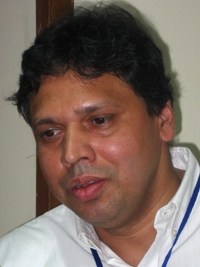ISJS
Series of 3 seminars on
Integrating Modern Science and Spirituality for Social Wellness:
A Challenge of 21st Century
Seminar "A"
Consciousness and Knowledge: Scientific and Spiritual Perspectives
Delhi
Sundday, December 12, 2010
Session IV (Sunday): 09.30-10.00
Abstract
From the Self to the Self: Sri Aurobindo's Integral Yoga and the Evolution of Consciousness
Indian perspectives on psychological functioning have almost no place in the Psychology curriculum of Indian universities. From a consciousness perspectives contemporary western formulations of the psyche which pervade the academia, have almost entirely focused on lower levels of consciousness. Indian treatises on human existence and psychological functioning, while acknowledging the lower levels, focus much more on higher levels of consciousness and the means to raise consciousness from lower to higher levels. It is held, in the Indian view, that human functioning on the higher levels is more effective, reveals a more complete knowledge accompanied with greater feelings of oneness, harmony, joy and love.
Sri Aurobindo held an evolutionary perspective but his focus was on the evolution of consciousness. Consciousness is the original, fundamental and essential stuff of the universe which has at some point manifested itself in such a way that material form comes into existence. In the earlier stages of human evolution, withdrawing from the higher planes of consciousness and returning to the lower, worldly planes involved a separation from the higher states which could not be brought down into waking consciousness. But humanity has evolved further, and today, and more so in the near future it will be possible for a greater number of persons to ascend to higher levels and then upon descending retain something of the higher which would also transform individual functioning on the material plane. Disagreeing with the illusionist Advaitic perspective, Sri Aurobindo affirmed a realistic Advaita as noted in the preceding passage. He emphasized the equal importance and significance of the material worldly existence as of the spiritual, and noted that the time has come when the higher spiritual consciousness will inspire and guide our life in the earthly form and thus the possibility of "The Life Divine". In his vast writings, numerous illustrations have been given which substantiate this view as well as evidences of all sorts have been provided which affirm the future vision of humankind.
Sri Aurobindo's portrayal of the human entity, as of existence in general, retains the Vedantic flavor in his reference to the nature of the true Self, the demarcation of layers or sheaths that a person is made up of, and the possibility of liberation from ego-boundedness i.e., the state of ignorance. Sri Aurobindo's system refers to these categories but in a somewhat different, more detailed and expanded form and the goal and endpoint of liberation and transformation via the process of Integral Yoga is radically different and more difficult to attain. In addition, new categories and finer distinctions have been added which make it possible to accommodate western conceptualizations of psychological functioning and personality in his comprehensive Integral view. In other words, Sri Aurobindo's perspective provides legitimate spaces for the insights gathered on human existence both from the West as well as the East, and allows us to integrate these and go beyond what any of the previous systems offer in terms of growth and expansion which are possible for the human being.
This paper details the issues and assertions outlined above, and summarizes the major tenets of Sri Aurobindo’s Integral Yoga, especially those pertaining to the evolution of consciousness.
Photos


 Prof. Dr. Suneet Varma
Prof. Dr. Suneet Varma